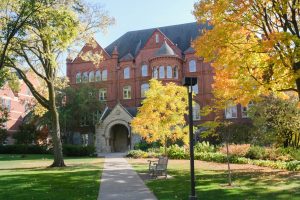by Alice Asch ’22
For literature and creative writing enthusiasts, Macalester has a gorgeous array of courses in store for next semester, many of which are being offered for the first time this spring. With subjects ranging from artistic muses to Afrofuturism to young adult fiction, these classes are sure to captivate. The Words has decided to profile a few of the English department’s brand new listings. Enjoy!
 Down the Rabbit Hole: Taught by the chair of the department, Andrea Kaston Tange, this course will begin by providing an overview of the “key issues” of the Victorian era, but it is hardly a conventional 19th century British literature class. Students will have the opportunity to delve into a topic of their choice, and will then spend most of the semester following the spirals of their research, ultimately producing a scholarly paper, a feature article or exhibit, and a podcast episode. Words Editor Dalton Greene ’22 plans to take the course, and says he is “really excited about its unique multimedia approach—it’s a great opportunity to get experience communicating the same findings in different ways for different audiences.”
Down the Rabbit Hole: Taught by the chair of the department, Andrea Kaston Tange, this course will begin by providing an overview of the “key issues” of the Victorian era, but it is hardly a conventional 19th century British literature class. Students will have the opportunity to delve into a topic of their choice, and will then spend most of the semester following the spirals of their research, ultimately producing a scholarly paper, a feature article or exhibit, and a podcast episode. Words Editor Dalton Greene ’22 plans to take the course, and says he is “really excited about its unique multimedia approach—it’s a great opportunity to get experience communicating the same findings in different ways for different audiences.”
Introduction to Asian American Literature: Macalester usually offers a “U.S Identities/Differences” literature course at least once a year, but this is the first time that the class is focusing on works by Asian American writers. This was a delight to English department student worker Anna Chu ’22, who began hearing about the possibility of such a course last year. “Every semester, I looked out for it!” she said. Taught by poet and professor Michael Prior, students will study authors such as Jhumpa Lahiri, Celeste Ng, and Ocean Vuong, and examine how news media and popular culture have shaped public perceptions of their writing.
Topics in African American Literature: Afrofuturism: Though this course has been offered before, this is the first time that it will not be taught as a capstone. Guided by Daylanne English, students will dive into the fascinating contemporary movement known as Afrofuturism, which represents alternate temporalities and “forms of the human” where Black people are centered. English said that she hopes students will gain an understanding of how “art, literature, and theory, through innovative form and content, can help us not only understand and shape, but also change ‘the real world.’’’ Class materials will span multiple genres, including Samuel Delany’s short stories, Janelle Monáe’s Dirty Computer “emotion picture,” and Wangechi Mutu’s visual art. According to English, the course might even feature some dancing over zoom.
From Literature to Film: Queer Muses in Film: Amy Elkins will be leading this thrilling exploration of the “muse,” which she defines as “the presiding spirit or force behind any person or creative act.” Via films such as Orlando and Looking for Langston, students will study queer muses in the context of gender fluidity, feminism, and cinematic visuality, paying special attention to those that bend the rules of the archetype. Words Editor Kira Schukar ’22 has enjoyed courses with Elkins before, so she couldn’t wait to register for this one. “She always manages to weave multiple media like craft and film into her English classes, and this course sounds like an especially interdisciplinary approach to literature,” Schukar said.
Crafts of Writing: Young Adult Literature: YA fans, rejoice! Author and professor Rachel Gold, who has written several young adult novels of their own, will impart their wisdom and experience to students in this workshop-based course. After learning about the crafts of character, voice, and plot, students will leave the class with a polished short story.
Crafts of Writing: World Building: Fantasy and science fiction lovers will feel right at home in this course. Under the guidance of writer and professor Emma Törzs, students will dive into queries like, “How can we believably represent an entire cosmos within the space of pages?” Words editor Teddy Holt ’22, who is currently in Marlon James’ fantasy writing class, can’t wait to continue honing their craft in Törzs’ course. “I love asking questions and coming up with answers, and I love the endless opportunity and motivation world building gives me to learn about my actual neighbors on the Earth,” Holt said.
Crafts of Writing: Imitations and Influences: Also taught by Törzs, this class takes a creative writing-centered approach to the themes of Amy Elkins’ “Muses” course. Students will revisit their most beloved literary and musical inspirations and engage in a “multi-genre study of what it means to be artistically influenced.” Examining the works of writers like George Saunders, Toni Morrison, and Denis Johnson, along with any of their own personal favorite authors, students will practice the art of imitation.